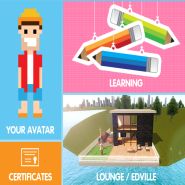Online education and the recent proposed summer schools have the potential to help retain lost knowledge over the past year after COVID has halted thousands of students’ academic progress.
The Department of Education has released their guidance on summer schools with the ultimate aim of delivering a mixture of innovative academic learning and thought-provoking engaging activities. The intention is to ensure pupils reacquire skills that may have diminished due to the pandemic.
The Department of Education research estimates:
“That in the first half-term of autumn 2020, pupils in Year 3-9 were on average around 1.6-2 months behind on their reading and those in Year 3-7 were around 3.2 months behind on their maths.”
With this radical deprivation in education standards, the value of online learning and summer schools has to be recognised as practical options to help reignite children’s aspirations and hone their academic skills.
Summer Schools’ Impact on Children and their Education
Experienced education leader Kausor Amin-Ali initially affiliated with EdLounge with the main aim of improving community relations and reaching educational targets. In a discussion with him, he said that:
“We can’t underestimate a whole generation of students who have missed out on their education, particularly at GCSE, so I think it is sensible that the DfE and other educational leaders have acknowledged significant gaps in learning and the need for catch ups such as proposing summer schools.”
COVID has hampered results with children suffering in a combination of academic, mental and physical factors. Evidence obtained by us suggests that online education and summer schools can help.
Kausor worked with current EDClass teacher Paul Kent at Balby Carr Community Sports and Science College in 2014, now known as Astrea Academy Woodfields and they achieved a vast improvement in results with a:
“Matchup between English and mathematics to 50% for the first time in the school’s history.”
Together, they delivered a “5pm-7pm club” and a “3pm-5pm club” enabling students to engage through a more relaxed learning environment.
From evaluating that period, it is apparent that the summer schools can act as a catalyst in improving results and ensure students retain lost knowledge.
“The identified pupils for the specific intervention in the ‘Maths 527 club’ achieved 83% A*-C in Mathematics, up from 19% at the start of the intervention and 81% in 3 Levels of Progress from Key Stage 2, up from 14% at the start of the intervention and also 10% of the students in this club making 4 levels of Progress.”
This one anecdotal piece of evidence illustrates just how beneficial out of school learning clubs such as evening, weekend or summer schools could be for this generation of students.
Incentives and their Impact on Education
Incentives such as food were utilised by Kausor and Paul at Balby and it is a testament to how much of an impact then can provide for young children with their learning. Kausor stated when he discussed his evening class success:
“Children had somewhere to go and they had a sense of belonging. It also built that community spirit which I think some schools have forgotten. Furthermore, as seen in last year’s campaign for free school meal provision continuity, a lot can be said about supporting children being fed and cared for. This provided a safety net and then it allows teachers to focus on learning.”
With children’s brains in critical developing stages, if they feel welcomed, their learning will improve demonstrating how vital incentives can be for academic development.
In addition to this, as a result of attendance enhancement through utilisation of online education, summer schools and incentives, progress can be made. This is evident with a testimonial from Springwell Lincolnshire (PRU):
“With EDClass, for two particular students, attendance has gone from virtually nothing to 80% plus, which has, of course, also raised their attainment dramatically.”
Blending Learning of Online Education and Summer Schools
Online education in a combination of proposed summer schools could become a viable alternate option of supplying education, particularly with COVID remaining for the foreseeable future. Kausor stated:
“Summer schools will help children come together and be social which is needed, especially after COVID, but using great platforms like EDClass you have the ability to continue to learn at your own pace. Being able to structure your learning is what will make summer schools successful.”
With our bespoke pathway for schools, our platform can supply a versatility of content with a distinctive recovery programme allowing children to regain abilities that a typical school day could not.
Some are pessimistic of the planned summer schools and even Paul who said:
“After this year with COVID I don’t think teachers will want to do summer schools mainly due to them being given a bad reputation from the pandemic and I doubt children will want to go either.”
Kausor elaborated on this:
“Paul’s point is valid – we may need a pool of undergraduates to oversee summer school rather than teachers who need respite.”
Education in general is at a fragile state. A recent article by The Guardian found that:
“The overwhelming majority of teachers – 98% – are opposed to an extended school day and shorter holidays as a means of helping children’s learning recovery after the pandemic.”
With such an enormous percentage of teachers opposed to extended school days and shorter holidays, it possibly paves the way for online education and summer schools to rectify the lost knowledge for children.
The Department of Education has also said in their guidance that:
“Funding will be made available to state-funded secondary and special schools, non-maintained special schools and pupil referral units.”
Would this cover every child if they needed support? EDClass has been readily made available to any student. We believe everyone is entitled to achieve their educational goals whatever their economic background.
Online Education Platforms Bridging Future Learning Gaps
EDClass has been delivering safeguarded content throughout the pandemic to bridge learning gaps. In combination with summer schools, the unique online blended approach can help alleviate educational drawbacks for children.
We can help implement a strategic recovery programme with our proven track record of assisting schools by reducing workload pressure enabling you to support your students in other aspects.
“EDClass has been invaluable during the lockdown. It has been a phenomenal success for us and really helped cope with the demands placed on us.”
In our professional opinion, summer schools have the potential to regain lost knowledge from the pandemic, but this cannot be achieved on its own.
With anything there will be drawbacks due to a number of factors. But, in conjunction with other avenues of education, such as online, it could enable the new generation of students, who are increasingly enthusiastic with technology, attain their previous standard of education and go beyond it.
Check out EDClass TV to see the abundance of lessons that could be at your disposal to help extend your learning capabilities!
Or for more information contact us here or phone us on 01909 568 338.










